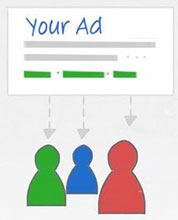Advertising Online: 6 Rules For Compelling Text Ads
Search engine advertising campaigns need the same amount of design, strategy and consideration as traditional offline advertising mediums. The message, the placement and the offer all need to be thoroughly vetted and tested to ensure success. Copywriting is a skill and an art; and because of the limited amount of text allowed in most online search advertising campaigns, being succinct is vital. The goal with these types of campaigns is to include popular keywords and keyword phrases that will bring you to the top of page rankings. Below is a list of 6 rules to help you create effective online advertising campaigns.
Rule #1: Obey The Rules
All search engines have slightly different requirements, guidelines and rules for their text advertisements for word count and format. Once you write a compelling ad, understand that you will have to tweak it for each of the major search engines that you intend to advertise on. Here is the general rule of thumb that with minimal tweaking will work across most advertising platforms:
Headline: 25 Characters Maximum
Display URL: 35 Characters Maximum
1st Line: 34 Characters Maximum
2nd Line: 35 Characters Maximum
Rule #2: Make URL And Landing Page Coincide
Make sure that the URL you choose to display in the advertisement coincides with the message on the landing page. If this is not the case, the search engine genies may disqualify the ad based on their rules and requirements.
Rule #3: Use Relevant Keywords
SEO tactics fail if relevant keywords and phrases are not used. Determine the keywords that represent your business and offerings and include those in the Headline and 1st line of text. Remember, these keywords, for the best results, should also be reflected on your landing page. Google AdWords Keyword tool and others can help you determine the most effective keywords for your website. The relevance of your keywords can influence your cost-per-click, clickthrough rate, and your overall quality score.
Rule #4: Use Proper Punctuation, Spelling And Capitalization
Proofread every word and letter of your advertisements. Punctuation, spelling and grammatical errors send the wrong message to your potential customer base. Take the time to review and make sure that the format, spelling and punctuation make your advertisement easy to read. Making an advertisement easy to read and comprehend at first glance means to avoid abbreviations that are not universally recognized. Title case is the recommended format as all caps in the text ads can cause your ad to fail the guidelines.
Rule #5: Leave Your Business Name Out
The amount of text that is allowed in search advertising does not allow for your business name to be included. When a customer clicks on your website however, they will see the name of your business. It is more important to get them to your site based on the offer and keywords than it is for them to recognize the business as yours from the advertisement.
Rule #6: Avoid Legal Battles
One of the consistent rules across all search engines for their advertising, is that unless you own the trademark for a particular product, you may not use it in your text advertising. Instead of using name brands that are trademarked in your text ads, use a more generic phrase. For example if you a brand name perfume, the keyword could be “luxury perfume”. Then, you would bid on the trademarked name as one of your keywords.
Creating compelling text search ads is not rocket science, but it does take a deft hand. Test the effectiveness of different keywords and phrases across the search engines to determine which advertisements are giving you the best ROI. Take the time to analyze what is working, and what is not working and adapt the text as your offers and products change.









